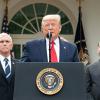How Prepared Are We to Stop a School Shooting in Athens?
Comment

Photo Credit: Broward County Sheriff's Office
Broward County Sheriff Scott Israel visits Parkland shooting survivor Anthony Borges.
We’re well past the “thoughts and prayers” phase of the sickeningly familiar ritual that follows mass shootings, like the Valentine’s Day massacre at a high school in Parkland, FL. Now we’re well into the “Do something!” phase. This is the phase featuring an avalanche of demands that we repeal the Second Amendment, ban assault weapons, do much more to identify and treat mental illness, break the National Rifle Association’s stranglehold on elected officials, overturn the U.S. Supreme Court’s Citizens United decision, arm teachers, help young males whose fragile sense of manhood draws them to firearms, crack down on violent video games, enact “red flag” laws… I’m sorry, I’ve lost track.
If not after Columbine, surely after Newtown the nation’s collective soul was shaken enough to muscle through the measures, whatever they are, that would at least mitigate if not end the slaughter of innocents.
Didn’t happen. Maybe it’ll happen this time. Or not. If history is any guide, local communities and school districts will be making a mistake to put their faith in Congress and state legislatures. Florida’s has already declined to consider a bill that would ban assault weapons. And back in 1994, when Congress enacted an assault weapons ban, it was riddled with loopholes, did little to reduce gun deaths and was allowed to expire in 2004.
Even if your favorite gun-control measure were by some miracle enacted, future administrations could undo it. For example, in the waning days of his tenure, President Obama put in place a measure that would make it harder for mentally unstable people to buy guns. No sooner had Donald Trump taken office than he rescinded it.
If we’ve learned anything since Columbine, it’s that school districts and the communities they serve are pretty much on their own in protecting their children. Government at all levels has proved to be an unreliable partner in that urgent work. Point the finger of blame where you will; it doesn’t change the fact that local communities and school districts have more than enough reason to double down on protective measures within their control while the blather and foot shuffling goes on elsewhere.
But in the mountain of reporting and comment about the Florida shooting I’ve processed, I’ve come across exactly one report, in the Atlanta Journal-Constitution, that even asked the question whether school districts are doing enough to ensure students’ safety. No doubt there’s understandable reluctance to ask that question after three teachers at the school in Parkland did the unimaginable, as teachers have done before—taking fatal bullets for their students.
Local communities and school districts are under an especially heavy burden because of the unique vulnerability of school children in their care. Adults are free to act on their own risk assessment when they’re thinking about a trip to the mall or the movies. But because we have mandatory school attendance up to a certain age in this country, except for the relative handful of homeschoolers, kids have no choice about whether to go to school. Students aren’t just their charges, but are also their legal captives.
I’m getting above my pay grade here, but I understand that some security measures, such as automatic lockdown systems, are commonplace in schools now. Sadly, in Parkland, according to the Sun Sentinel, Broward County’s newspaper, the lockdown was undone when Nikolas Cruz, charged in the shooting, set off the fire alarm system, which is designed to cancel the lockdown. What also seems to be commonplace is active-shooter drills in which students are taught to use desks and closets as shelter, neither of which are designed for the purpose. The only report of high-impact glass in the Parkland school was of a window to the outside. Cruz was unable to break it to fire on fleeing students below. He’s reported to have met no such resistance when he broke out windows in classroom doors.
While some lessons about school design and construction have been learned in the years since Columbine, I have to wonder how much more school districts could do with the right expert advice and supportive local communities. One source of advice that I happened on just after the Parkland shootings is the National School Safety Center, established in 1984 as a joint project of the U.S. Departments of Education and Justice and now an independent nonprofit organization.
To my layman’s eye, one of the center’s services worth investigating is its school safety assessment. I have no idea what an assessment costs or how valuable it is, but it seems that all it would take to find out is a phone call from someone in our district office to the Atlanta Public School System. However, when I asked one of our school board members whether he’d heard any discussion or even mention of the organization in board meetings, he said he hadn’t. And a current candidate for a school board seat reported that she’d never heard of the center.
Ultimately, of course, school districts can do only what the community will pay for. When school budgets are so tight that teachers have to buy supplies for their students out of their own pockets, it’s hard to be optimistic about funding for hardened school buildings that give occupants a better chance of surviving their days in them. When an Atlanta television station invited viewers to text an opinion about whether they’d be willing to pay higher taxes to buy bulletproof classrooms, the vote was running two-to-one against when I tuned in.
But Georgia’s special purpose local sales tax law affords a relatively painless way to protect our kids. It’s a broad-based levy that doesn’t raise anybody’s property taxes. And if we’re willing to use it to buy basketball courts and football stadiums, it doesn’t speak well for us if we’re unwilling to use it to buy our children even marginally more favorable odds of growing up.
So while the warring political tribes have at it over the Second Amendment, the NRA and whatnot, how about we take care of business at home?












comments